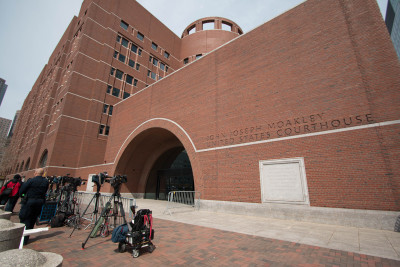
Attorneys for Dzhokhar Tsarnaev argued Tuesday at the John Joseph Moakley United States Courthouse, calling for a new sentencing trial to challenge the conviction and the death sentence Tsarnaev received for his role in the 2013 Boston Marathon bombings and the violence that ensued.
The 22-year-old former University of Massachusetts Dartmouth student was found guilty of placing bombs at the marathon finish line with his older brother Tamerlan. The attack killed three and injured nearly 300.
A jury found Tsarnaev guilty of all 30 counts on which he was convicted and later sentenced him to death on six of the 17 counts carrying the death penalty, The Daily Free Press reported on May 16.
In the first motion of the hearing, the defense argued that several of the counts against Tsarnaev should be reconsidered in accordance with the U.S. Supreme Court decision in Johnson v. United States.
The Johnson case, decided a little over a month after Tsarnaev’s conviction, struck down a provision of the Armed Career Criminal Act of 1984, a law which provides more extreme sentences for individuals convicted of “violent felonies.”
Under this law, a “violent felony” is defined as violent, physical force. The provision in question, known as the “residual clause,” extended that definition to include any action that “presents a serious potential risk of physical injury to another,” language the Supreme Court ruled unconstitutionally vague. Defense attorney Bill Fick argued that the principle of ability to cause an injury by violence is “a necessary component” but “not alone sufficient.”
“If it doesn’t entail violent force, it is not categorically a crime of violence,” Fick said.
In the defense’s argument, Tsarnaev’s attorneys talked about the six death sentence counts — use of a weapon of mass destruction, bombing of a public place, malicious destruction of private property, conspiracy offenses, carjacking and robbery — with the Johnson case as a background. The defense argued that a number of the death sentences fell under the nullified residual clause of the ACCA.
“Half of the death sentences called into question are invalidated by Johnson,” Fick said. “We’re talking about the crimes as defined by Congress. For the court to engraft that onto this legal structure, there’s no basis to do that.”
Fick said since they don’t know the number and nature of how Tsarnaev’s convictions came together, the motion for a new trial is necessary.
U.S. District Judge George O’Toole, however, said the categorical approach with which the court made convictions is a convenient and reliable method.
“In a case such as this, we don’t have to worry about whether it was intimidation,” O’Toole said. “We know what the evidence was and we know which crime the jury was looking at.”
In the context of the Johnson case, the prosecution argued that physical force is violent force because it is separate from intellectual or economical force.
“A common sense reading of these statutes is that they require physical force,” said the prosecution’s Bill Weinreb.
He gave the example that setting down poison gas is not inherently violent, but gas can cause harm in a potentially violent way. Weinreb also made the case that carjacking wasn’t just intimidation, but intimidation with the threat of physical force.
Weinreb said the defense argument doesn’t make sense and can’t “possibly be what Congress intended.”
The second motion of the hearing was the argument that the government had access to alleged firewalled information about the Special Administrative Measures (SAMs) Tsarnaev is facing in prison.
The defense’s Miriam Conrad said the government provided no valid argument for disclosure of such information and that “there is a compelling need to maintain the status quo for the firewall for the prosecution.”
Weinreb responded by contending that the government was not in the wrong and has “no reason to believe” that any of the firewalled information the government acquired “is privileged or worth protecting.”
In response to the prosecution, Conrad said the government is erroneously setting up standard procedures without disclosing why.
“I feel a bit like Alice going through the looking glass on the government saying this is the way things should be done,” Conrad said. “In any criminal case, there are experts who meet with the defendant. The government doesn’t get to know about them.”
In the third and final motion, the prosecution requested O’Toole order Tsarnaev pay restitution to victims.
The hearing ended with O’Toole informing both sides that they will receive a thumb drive from the clerk’s office with documents they submitted under seal. The next course of action for both sides is to read the documents and declare which ones will be unsealed and shared with the other side.
Tsarnaev was not present at Tuesday’s hearing, as he remains in the United States Penitentiary Administrative Maximum Facility, also known as ADX “supermax,” in Florence, Colorado.





















































































































